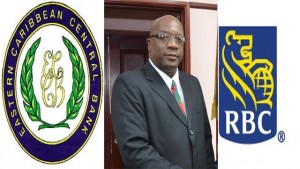 The Eastern Caribbean Central Bank (ECCB) in a statement issued on Monday expressed concerns about the increase in commercial banks’ fees and charges across the Eastern Caribbean Currency Union (ECCU) and the effects on depositors while advising that it has no authority to regulate the banks. The ECCB statement acknowledged that the banks determine their own fees and charges,and encouraged customers to carefully consider which banking options best suit their needs and called on the banks to explain the rationale for their actions.
The Eastern Caribbean Central Bank (ECCB) in a statement issued on Monday expressed concerns about the increase in commercial banks’ fees and charges across the Eastern Caribbean Currency Union (ECCU) and the effects on depositors while advising that it has no authority to regulate the banks. The ECCB statement acknowledged that the banks determine their own fees and charges,and encouraged customers to carefully consider which banking options best suit their needs and called on the banks to explain the rationale for their actions.
Article 34 of the ECCB Agreement permits the ECCB to regulate the minimum savings rate, that is, the minimum interest rate paid on savings deposits. The Monetary Council, comprising the eight ministers with responsibility for Finance in the ECCB countries, in November 2015, approved several recommendations related to bank fees, the release added without spelling out which ones were approved or in effect.. The ECCB statement follows a hike in bank charges that has resulted in depositors withdrawing their money and closing accounts on St. Kitts, Antigua, and in St. Vincent and the Grenadines.
The Royal Bank of Canada on St. Kitts announced a $25 charge on savings accounts effective Monday, May 23. Several customers closed their account as a result. An RBC press release issued on Friday 20th May, while not addressing the substantive issue of the $25 levy imposed, outlined that a suite of banking services necessitated the imposition of new fees.
Meanwhile the federation’s PM, the Hon. Dr Timothy Harris in a statement released by his office has indicated that “by law, it is the role of the Eastern Caribbean Central Bank (ECCB) to supervise and regulate all banking activity within the Eastern Caribbean Currency Union (ECCU), and the Governments within the region do not have any authority to regulate bank charges and fees. The Monetary Council and the Board of Directors govern the work of the ECCB.
The Monetary Council comprises eight Ministers of Finance, one from each member government within the Union. Prime Minister Dr. the Honourable Timothy Harris, who is the Minister of Finance in St. Kitts and Nevis, has sat on the Monetary Council since February 2015. It is also worth mentioning that the issue of bank fees is a longstanding one that has come before the Monetary Council on a number of occasions, including during the tenure of the former government. Dr Harris said “My Government has been made aware that banking fees have now been increased and/or new fees introduced at some commercial banks operating within St. Kitts and Nevis and the wider Caribbean region. These increases and those proposed have led to unease among the population, and some customers are exercising their right to withdraw their funds.
The fee structures being proposed in St. Kitts and Nevis are similar to those also being proposed in other territories of the Caribbean, and customers in some of those jurisdictions have responded also with unease.
Meanwhile Opposition Leader Dr Denzil Douglas Speaking at the 84th conference of the SKNLP, called on the RBC too reconsider its $25 fee as it adversely affects the livelihood of its ordinary banking sector, who can hardly afford the increase. Douglas further called on Pm Harris to meet with the bank to mediate a way forward, failing which he advised that he would do it himself.
